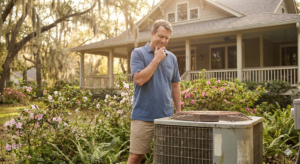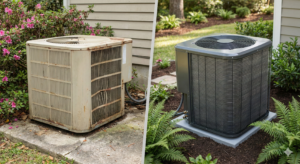Summer storms in Charleston can come on fast and hit hard. While we often think about protecting our homes and vehicles, the HVAC system is easy to overlook. With high winds, heavy rain, and power surges, a summer storm can put a lot of stress on your heating and cooling equipment. That kind of damage isn’t just a hassle. It can leave your home uncomfortable right when you need relief the most.
Your HVAC system works hard to keep your home at the right temperature year-round, and it deserves protection during storm season. From outdoor unit damage to sudden shutdowns, these weather events can cause problems that are both costly and inconvenient. Taking the right steps before, during, and after a storm hits Charleston can help you avoid bigger issues later and keep your system running smoothly.
Understanding Summer Storms In Charleston
Living in Charleston means hot, humid summers that often bring sudden and intense storms. Afternoon thunderstorms are common, and they usually involve strong winds, heavy rainfall, and plenty of lightning. On top of that, the storm season overlaps with hurricane season, which can bring even more extreme weather into the mix.
These conditions can do serious harm to HVAC systems, especially those with outdoor units exposed to the elements. Here’s how summer storms can impact Charleston heating and air systems specifically:
– Power Outages: Storms often knock out electricity. A sudden loss of power can shut off your HVAC system in the middle of use, which can damage its internal parts if it restarts in the wrong way.
– Power Surges: Electrical surges during lightning strikes or when power is restored can wreck your system’s circuit boards.
– Flooding: Heavy rainfall can collect around your outdoor unit, especially if your yard doesn’t drain well. Constant exposure to water can impact both the inside and outside of the unit.
– Debris Damage: Branches, trash, and other objects can get blown into your system, denting the casing or damaging the fan blades and coils.
One example that comes up often is a homeowner who left lawn chairs and garden tools near their system before a summer storm. Winds blew several items into the large fan blades, bending them and leaving the unit stuck. Repairs like this mean being left without cool air in the middle of a hot Charleston day, and they’re preventable.
Even if your system keeps working after a storm, small bits of damage can build over time. Acting early helps prevent breakdowns and helps catch small problems before they grow into costly repairs.
Preparing Your HVAC System For Storms
The best way to limit damage is to prepare your HVAC system before you ever see storm clouds. Taking a few simple actions ahead of time can go a long way in keeping both comfort and costs in check.
Here’s what Charleston homeowners should do before the next storm:
1. Clear the area around your outdoor unit. Trim shrubs, rake leaves, and make sure there’s nothing like toys, tools, or decorations that could blow into the unit.
2. Tie down or store outdoor furniture. Lightweight chairs and tables can get swept up in strong winds and crash into your HVAC system.
3. Schedule a storm-season inspection. Having a local professional check your equipment at the start of summer helps spot any weak spots or wear that might lead to problems during a storm.
4. Install a surge protector. This adds a layer of defense that can shield your HVAC system from unexpected electrical spikes.
5. Consider a backup power source. A generator can keep your system running even if the neighborhood loses power, helping maintain indoor comfort and air circulation.
Planning ahead might take a little time, but it’s easier to deal with storm prep on a sunny day than in the middle of an emergency. A few precautions now can save you from losing your cool later.
Protecting Your HVAC System During a Storm
As a storm approaches, there are steps you can take to shield your HVAC system from the brunt of the weather. First, it’s a good idea to turn off your system at the thermostat to avoid damage from power surges. This will help keep the internal components safe from potential harm when the electricity fluctuates during the storm.
Next, cover your outdoor unit. Use a breathable fabric cover, which can protect against flying debris while still allowing moisture to escape. Be careful to avoid using plastic or anything that traps moisture, as this can lead to rust or mold. During the storm, keep a safe distance from windows and doors and monitor your system from inside your home. If the weather conditions become severe, keep yourself informed through local news or weather apps.
Post-Storm Maintenance and Inspection
Once the storm has passed and it’s safe to go outside, take a few minutes to check your HVAC system. Start by looking for any visible debris or damage around your outdoor unit. This includes leaves, branches, or anything else that might have been blown over during the storm. Clearing these items away ensures proper airflow and prevents clogging or blockage.
Examine your system for any signs of damage, such as bent fins, loose wires, or water pooling around the unit. While you can handle some of this inspection on your own, a professional check-up is also wise to ensure nothing has been damaged internally. Getting a trained eye on your system can reveal hidden issues that might not be immediately obvious but could lead to costly repairs down the line.
Ensuring Long-Term Protection
Protecting your HVAC system from summer storms isn’t just about immediate actions. Ongoing maintenance and occasional upgrades can offer long-term safety for your system. Regular check-ups during the storm season can catch small issues before they escalate into major problems. Consider also upgrading your system with advanced protective measures like surge protectors and improved drainage systems.
One way to think about this is like weatherproofing a home. Just as you would strengthen your windows or secure your roofing to withstand storms, adding these features to your HVAC system provides that extra layer of security. They act as a shield, preventing electrical and water damage, keeping your equipment running smoothly no matter what the weather throws at you.
Stay Safe and Comfortable in Any Weather
By taking these steps, you’re not just protecting your HVAC system. You’re also helping to ensure your home remains a sanctuary during turbulent storms. Each precaution you take adds to the overall durability of your heating and air system. It’s all about planning ahead and taking thoughtful steps to deal with Charleston’s summer storm season.
Remember, while a little prep work goes a long way, knowing when to call in the pros is equally important. Trained experts can often spot potential issues and determine the best solutions more effectively. With a well-protected HVAC system, you can focus on enjoying the summer, knowing your home comfort is secured.
As you navigate the challenges of protecting your HVAC system during Charleston’s unpredictable summer storms, it’s smart to have a local team you can rely on for maintenance and repairs. Learn how Coastal Carolina Comfort can help you stay comfortable year-round with dependable Charleston heating and air services tailored to your home. Get in touch today to schedule expert support that keeps your system storm-ready.


